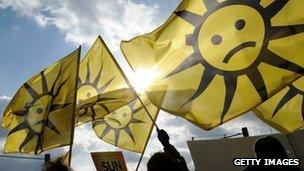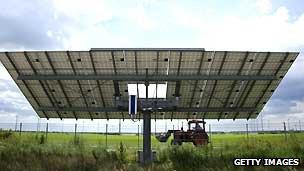Will sun still shine on Germany solar power industry?
- Published

Many staff in the German solar power sector now fear for their jobs
Is the sun setting on solar? If there's a country on the planet that's embraced the generation of electricity from the sun, it is Germany.
It has between a third and a half of the world's photo-voltaic cells - but in this heartland of solar energy, the industry sees dark clouds looming.
Subsidies are falling. Makers of solar panels have gone bankrupt.
Thousands of employees, fearing for their jobs, have just held a demonstration in Berlin.
Mainstream, influential magazines run headlines like Solar Subsidy Sinkhole: Re-evaluating Germany's Blind Faith in the Sun.
And if solar is being eclipsed in the world's green heartland, can its future be brighter elsewhere?
The source of the immediate woe is a cut in subsidies by 30% in the next year.
The government says that's because of the great success of the scheme: so great has been the demand for solar panels because of the lower price that the budget for it has been far exceeded.
But now the subsidy is being cut, the industry is finding it tougher.
'Pressure'
Some German manufacturers of solar panels have gone out of business. All feel a chiller wind.
Ina von Spies is one of the executives at Q.Cells which makes solar panels.
"There's a lot of pressure on the makers of solar panels because we have a very, very high over-supply and that makes it very difficult to sell the products we produce at a reasonable price," she told the BBC.

Some say the government made mistakes in the way they handed out solar subsidies
Cut-price competition from China hasn't helped German producers either.
Some makers of solar-panels say the German government made a mistake by not making sure that when subsidies went to German installers of these photo-voltaic cells, it would be German manufacturers that got the money in the end - rather than Chinese ones who were quick to spot a market.
The subsidy, they say, should have helped German industry too.
But there is also broader questioning of whether Germany's embrace of solar power was wise. It is not the sunniest country.
"We should deploy solar energy where the sun is shining - in Spain, Italy or North Africa, but not in Germany," says Professor Fritz Vahrenholt, chief executive of the big energy company, RWE Innology.
He says Germany gets the same amount of sunshine as the US state of Alaska, while Spain gets three times as much - and that means that Spanish solar power could be a third cheaper than that in Germany.
'Investors'
Prof Vahrenholt has written a book called Die Kalte Sonne - The Cold Sun - which is sceptical of global warming being caused by human activity, and because of this scepticism, questions the need for the switch into alternatives to carbon fuels.
He told the BBC that the way the solar subsidy works in Germany means it is a redistribution of money from poor to rich, because people in apartment blocks do not have solar panels and tend to be poorer than those who own their own homes and so can put them on their roofs.

There are questions about whether Germany has the right weather conditions for solar power
"The investors are in the south of Germany in Bavaria," he says.
"The richer people, the farmers, can invest in solar roofs on their own homes, and those in apartment buildings have to pay an extra 80 euros a year. It is a transfer from the poor to the rich."
The problem with solar is, how do you make good the gap when the sun isn't shining?
Its critics say you need to duplicate power-generating resources, so the cost of solar power in an unsunny country is relatively high.
Wind and hydro-power in Germany are much more cost-effective.
This matters because Chancellor Angela Merkel's government decided just under a year ago to close the country's nuclear power stations - which provided just under a quarter of the country's electricity. The country really would go much greener.
Or so the intention was. But if solar can't help fill the gap, what will?
The fear of the campaigners who lobbied to get rid of nuclear is that it will be... nuclear which fills the gap - Czech nuclear, French nuclear and Polish nuclear.
Polish moves
The Polish government has announced plans for nuclear power stations, including one less than 100 miles from Germany.
The view of the Polish government is that this is the most cost-effective way of lowering the country's carbon foot-print by moving away from coal-fired power stations.
But it has led to protests in the east of Germany.
The environment minister for the state of Brandenburg, which borders Poland, wrote to the Polish economics ministry.
He said: "It is incomprehensible to me that our Polish neighbours still want to stick to their plans after the Fukushima disaster."
The spokeswoman on energy for the Left Party in the Bundestag, Dorothee Menzner, told the BBC: "I think it's a great disaster and I think it's not necessary for Poland and I think it's a step backward."
But what can anti-nuclear opponents do, given that German's pro-nuclear neighbours all supply the same grid which knows no boundaries?
"For us, it's very difficult. We can only discuss with the Polish parliament and Polish people," says Ms Menzner.
But the Polish parliament and people are showing no signs of taking Germany's non-nuclear route.
And they've seen a nice and near market open up for electricity not made from sunshine, but uranium - and maybe coal.